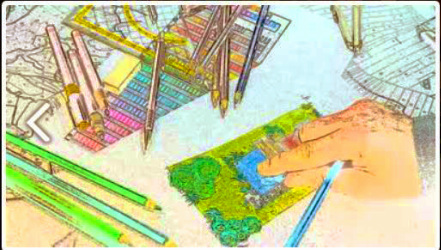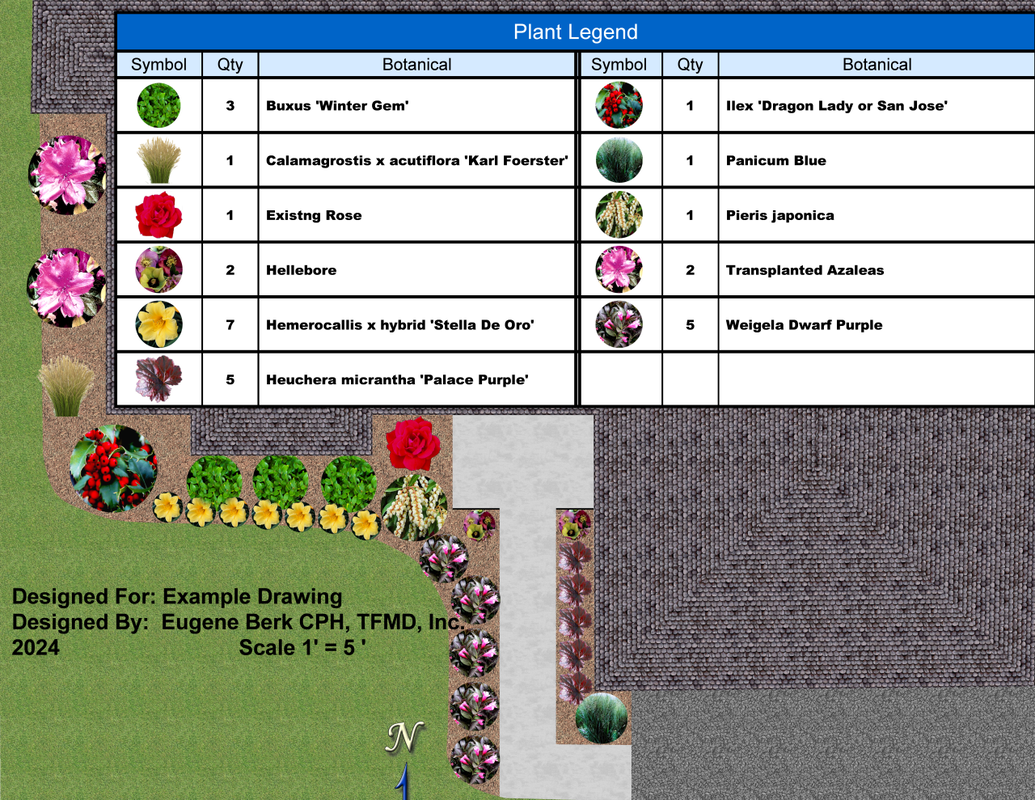
How to Hire a Landscape
Designer
It's estimated that homeowners can recover 150% and more of the money they invest into well planned landscaping when they sell their residences. Landscaping includes softscaping (i.e. plantings), hardscaping (outdoor construction projects such as decks, patios, walls, walkways, etc.) and maintenance services such as pruning, mowing, mulching, etc. Hiring a professional Landscape Designer to assist you in designing your landscape will help you avoid mistakes and problems that may actually lower your property's value!
The following are some points to consider on hiring a reputable and knowledgeable Landscape Designer.
Designer
It's estimated that homeowners can recover 150% and more of the money they invest into well planned landscaping when they sell their residences. Landscaping includes softscaping (i.e. plantings), hardscaping (outdoor construction projects such as decks, patios, walls, walkways, etc.) and maintenance services such as pruning, mowing, mulching, etc. Hiring a professional Landscape Designer to assist you in designing your landscape will help you avoid mistakes and problems that may actually lower your property's value!
The following are some points to consider on hiring a reputable and knowledgeable Landscape Designer.
Know What You Want
Every homeowner's needs are unique, so think carefully about how you want to use your outdoor living space before you call in a designer. Write down the questions this process raises. For example you may have softscape questions such as:
a) Do you want the entire landscape cleared and redone?
b) Will you need a place for the kids to play?
c) Do you need plants that are not hazardous to children and/or pets?
d) Do you need plants and trees which are low maintenance?
e) Sod or seed?
Or your needs may involve hardscaping issues which raise questions such as:
a) What size of patio or deck do I need?
b) Is my yard so steep that I need to terrace it and build retaining walls?
c) Do I want an outdoor kitchen?
With respect to maintaining your landscape ask:
a) When is the best time to prune my trees and shrubs?
b) How often should my lawn be mowed.
c) How much and what kind of mulch should I use? When should it be applied?
Keep in mind that not all Landscape Designers are equally knowledgeable in all three elements of landscaping; softscaping, hardscaping and maintenance. Those who merely call themselves “Landscapers” may have little knowledge in the design phase. They may have knowledge in how to install plants and how to build hardscapes, but that doesn’t mean they know the critical aspects of designing these elements. A Landscape Designer who has the training, experience and knowledge of all three aspects will be better able to help you to obtain the most out of your outdoor living space. The Landscape Designer may help you obtain the services of competent landscapers to perform the installation of the soft and hard scape elements and to provide future maintenance services. Most of all, select a Landscape Designer who not only encourages your input but also actively listens to what you are saying and replies with well-reasoned responses.
Be Involved!
You should actively involve yourself, not only in the pre-installation or design stage of any landscaping project, as stated above, but be involved throughout the installation and/or maintenance phases as well. Don't be afraid to say what's on your mind as you will have to live with the work performed or end up paying someone else to finally obtain your desired results. Whenever possible, talk to your Landscape Designer prior to the installation phase and ask if he/she will be able to assist you after the installation of the Soft and/or Hardscape elements with any questions you may have on maintenance and/or, if problems occur, regarding the proper remedial actions that should be taken. During your “interview” of potential Landscaper Designers you should evaluate how well they respond to your suggestions and critical questioning of their ideas. Weed out those who are dismissive or become offensive mistaking your questions as a challenge of their expertise.
What Should a Professional Landscape Designer know? How Reliable is He/She?
A Landscape Designer must know which plants will work best in your yard based on the soil type, exposure to the sun, and other climate/environmental conditions. A competent/professional Landscape Designer will also have hardscape design/construction knowledge and be able to explain to you in simple English how to best maintain your landscaping.

Determine that the Landscape Designer is knowledgeable. The Maryland Nurserymen’s Association established a voluntary program for those desiring to demonstrate proficiency in horticulture. In Maryland, therefore, a Landscape Designer can become a Maryland Certified Professional Horticulturist after meeting a combination of educational and work-experiences, and studying a comprehensive manual, then passing a rigorous examination testing the designer's knowledge of plants, related hard and softscaping materials, planting installation techniques, and other relevant information pertinent to the landscape industry. Also it is important to ask is how long has the Landscape Designer has been designing landscapes for clients. Long established Landscape Designers will be more invested in their reputation and likely to do whatever they can to make you happy!
Costs & The Difference Between a Landscaper and a Landscape Designer!
Economic efficiency is important, but beware of going with the cheapest for you may find yourself paying for it in the future. It’s also very important to be sure you are comparing apples to apples and not apples to oranges. Make sure you know what it is you are being offered. What is the quality of the plants and materials they are specifying to be used. How well versed is the landscaper or the Landscape Designer. Does he/she appear to know their “stuff”? Keep in mind that experienced Landscape Designers can often avoid potential problems that less experienced “landscapers” might not even know exist. This may raise the initial price, but it could save you from installing plants requiring regular and expensive maintenance, tree roots cracking your home's foundation, a deck or patio that is either too small or too large for your needs, and other landscaping errors which may leave you unsatisfied and feeling that you've wasted your money.
A "landscaper" is not necessarily adept at landscape design! While they may be few, beware, there are unscrupulous and inept landscapers who pass themselves off as Landscape Designers. The short cuts they take due to a lack of specialized knowledge and experience may do lasting damage to your landscape. Ask questions about the types of plants and materials recommended by the landscaper. For example, although fast-growing foundation plantings may be less expensive and offer nearly immediate results; unless you are planning to move in a year or two after installation they will require higher maintenance to keep them from overwhelming your windows and entryways. Don't under estimate the cost of pruning and fertilizer to keep cheap but fast growing plants in check and healthy; they can be substantive! Also, unlike a Landscape Designer, most of a landscaper's source of revenue is maintenance! That is an incentive to installing fast growing high maintenance plants! What you save with a lower bid from a landscaper may be lost in the long term due to high maintenance costs.
Comfort
Homeowners who have reported the greatest satisfaction with their completed landscape project often noted that the most important aspect of the Landscape Designer they eventually hired was the feeling of comfort they had with him/her. They appreciated the time and effort the Landscape Designer put into carefully designing their landscape and eliciting the involvement of their clients. Landscape Designers who received the highest praises were the ones who clearly demonstrated that they were listening to the homeowner by incorporating the client's suggestions, needs, likes and ideas into the design. Don't hire a Landscape Designer you are not comfortable with.
Costs & The Difference Between a Landscaper and a Landscape Designer!
Economic efficiency is important, but beware of going with the cheapest for you may find yourself paying for it in the future. It’s also very important to be sure you are comparing apples to apples and not apples to oranges. Make sure you know what it is you are being offered. What is the quality of the plants and materials they are specifying to be used. How well versed is the landscaper or the Landscape Designer. Does he/she appear to know their “stuff”? Keep in mind that experienced Landscape Designers can often avoid potential problems that less experienced “landscapers” might not even know exist. This may raise the initial price, but it could save you from installing plants requiring regular and expensive maintenance, tree roots cracking your home's foundation, a deck or patio that is either too small or too large for your needs, and other landscaping errors which may leave you unsatisfied and feeling that you've wasted your money.
A "landscaper" is not necessarily adept at landscape design! While they may be few, beware, there are unscrupulous and inept landscapers who pass themselves off as Landscape Designers. The short cuts they take due to a lack of specialized knowledge and experience may do lasting damage to your landscape. Ask questions about the types of plants and materials recommended by the landscaper. For example, although fast-growing foundation plantings may be less expensive and offer nearly immediate results; unless you are planning to move in a year or two after installation they will require higher maintenance to keep them from overwhelming your windows and entryways. Don't under estimate the cost of pruning and fertilizer to keep cheap but fast growing plants in check and healthy; they can be substantive! Also, unlike a Landscape Designer, most of a landscaper's source of revenue is maintenance! That is an incentive to installing fast growing high maintenance plants! What you save with a lower bid from a landscaper may be lost in the long term due to high maintenance costs.
Comfort
Homeowners who have reported the greatest satisfaction with their completed landscape project often noted that the most important aspect of the Landscape Designer they eventually hired was the feeling of comfort they had with him/her. They appreciated the time and effort the Landscape Designer put into carefully designing their landscape and eliciting the involvement of their clients. Landscape Designers who received the highest praises were the ones who clearly demonstrated that they were listening to the homeowner by incorporating the client's suggestions, needs, likes and ideas into the design. Don't hire a Landscape Designer you are not comfortable with.
